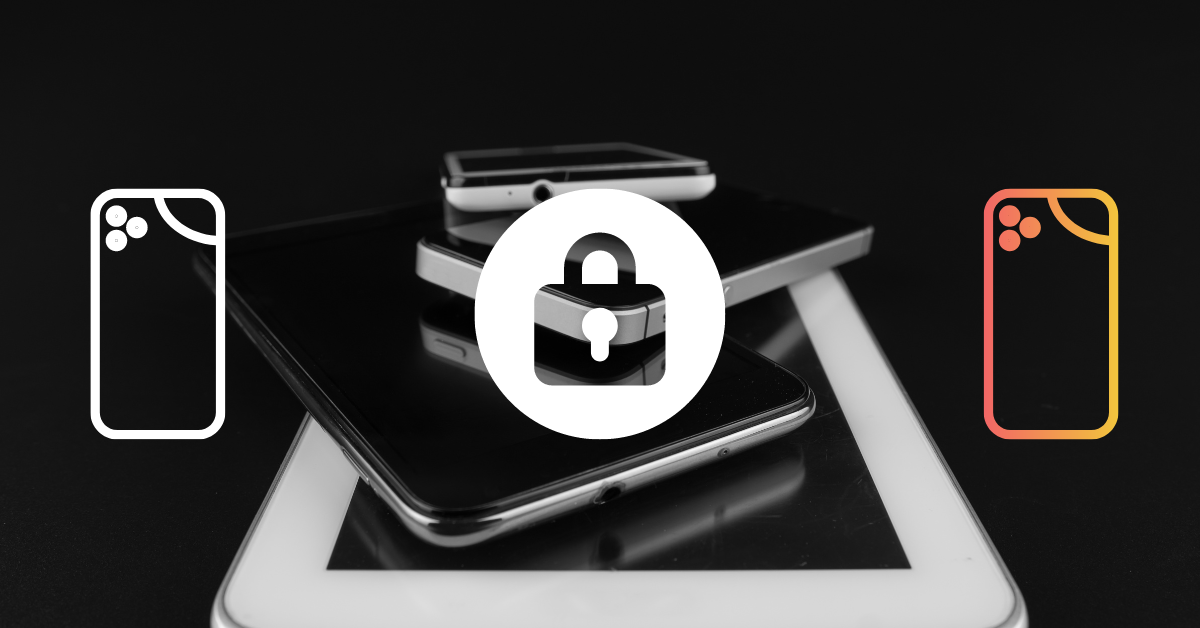Encryption is a crucial aspect of data security, especially for mobile devices. I will delve into mobile device encryption, its importance, and the various types and tools available for secure data protection.
Understanding Mobile Device Encryption

Mobile device encryption encodes the data stored on smartphones, tablets, and other portable devices to protect it from unauthorized access or theft. By transforming the data into an unreadable format, encryption ensures that even if someone gains physical or remote access to the device, they won’t be able to decipher the information.
What is Mobile Device Encryption?
Mobile device encryption utilizes complex algorithms to convert plain text data into ciphertext, a chaotic and unintelligible form. This ciphertext can only be deciphered with the correct encryption key or password, which acts as the key to unlock the encrypted data. This powerful security measure significantly reduces the risk of sensitive information falling into the wrong hands.
When a mobile device is encrypted, the data is scrambled using mathematical algorithms, making it virtually impossible for unauthorized individuals to understand. This process involves converting the original data into random characters without meaning. The encryption key acts as the secret code to decrypt the data’s original form.
Advanced Encryption Standard (AES) is one of the most commonly used mobile device encryption algorithms. AES is a symmetric encryption algorithm, meaning the same key is used for encryption and decryption. This ensures that only individuals with the encryption key can access the data.
Why is Encryption Important for Mobile Devices?
In today’s interconnected world, mobile devices have become integral to our personal and professional lives. We use them to access email, conduct financial transactions, store personal photos, and more. For this reason, ensuring the security and privacy of the data stored on these devices is of utmost importance.
Encryption is a robust defense mechanism that protects sensitive information from eavesdroppers, hackers, and even governmental surveillance. It safeguards personal data such as passwords, social security numbers, credit card details, and other confidential information that, if exposed, could lead to identity theft, financial loss, or reputational damage.
Without encryption, the data on mobile devices would be vulnerable to various threats. For example, if a smartphone is lost or stolen, an unauthorized individual could access the device’s data by bypassing security measures. However, with encryption, the data remains secure and inaccessible without the encryption key, even if the device falls into the wrong hands.
Encryption also plays a crucial role in protecting data during transmission. When data is sent from a mobile device to a server or another device, attackers can intercept it. Encryption ensures that even if the intercepted data is accessed, it remains unreadable and useless to anyone without the encryption key.
Furthermore, encryption helps organizations comply with various data protection regulations. Many industries, such as healthcare and finance, have strict requirements for protecting sensitive information. By implementing encryption measures, organizations can demonstrate their commitment to safeguarding data and reduce the risk of regulatory penalties.
Overall, mobile device encryption is an essential security measure that provides peace of mind to individuals and organizations alike. It ensures that sensitive data remains confidential and protected, even in the face of evolving cyber threats.
Types of Mobile Device Encryption

Mobile device encryption comes in different forms, offering unique advantages and considerations. Let’s explore the three primary types:
Device Encryption
Device encryption involves encrypting the entire storage space of your mobile device. This approach ensures that your device’s file, app, photo, document, or email is protected. Encrypting the entire storage eliminates any gaps where data may remain unencrypted, enhancing security and mitigating potential vulnerabilities.
When you enable device encryption, your mobile device uses complex algorithms to scramble the stored data. This makes it incredibly difficult for unauthorized individuals to access your personal information, even if they gain physical access to your device.
Device encryption also provides an added layer of security in case your mobile device gets lost or stolen. Without the encryption key, the data on your device becomes virtually inaccessible, ensuring that your sensitive information remains protected.
File Encryption
Unlike device encryption, file encryption targets specific files or folders rather than the entire storage. It allows you to choose which files are encrypted, providing flexibility and control over what data receives an extra layer of protection.
File encryption is useful for sensitive documents or confidential files you want to safeguard while leaving other files unencrypted for quick and convenient access. For example, you can encrypt financial documents, medical records, or legal contracts, ensuring only authorized individuals can access and view them.
When you encrypt a file, it becomes unreadable without the encryption key. This means that even if someone gains unauthorized access to your device or the file itself, they won’t be able to decipher its contents without the encryption key.
App Encryption
App encryption protects specific apps installed on your mobile device. This type of encryption focuses on securing the data within a selected application, such as messaging or email apps, banking apps, or even productivity tools.
Encrypting app data adds an additional security measure to protect your confidential information while accessing these applications. For example, if you use a banking app, encrypting the app’s data ensures that your financial transactions and personal details are secure, even if someone gains unauthorized access to your device.
App encryption often works with other security measures like password protection or biometric authentication. This multi-layered approach adds an extra level of security to prevent unauthorized access to your sensitive information.
Furthermore, app encryption can protect your privacy by preventing unauthorized apps or malicious software from accessing or tampering with the data stored within secured applications.
In conclusion, mobile device encryption is crucial for maintaining the security and privacy of your personal information. Whether you choose device, file, or app encryption, each type offers its advantages and considerations. Implementing encryption measures ensures that your data remains protected, even if your mobile device falls into the wrong hands.
Top Mobile Encryption Tools
Several tools stand out for their effectiveness and reliability regarding mobile device encryption. Let’s take a closer look at some of the top options:
BitLocker
BitLocker is a leading encryption tool developed by Microsoft. It offers robust encryption capabilities and seamlessly integrates with Windows devices. With BitLocker, you can encrypt your device or specific drives, ensuring comprehensive data protection.
One of the key features of BitLocker is its ability to encrypt the Windows operating system itself. This means that even if someone gains unauthorized access to your device, they won’t be able to access your data without the encryption key. BitLocker also supports using a Trusted Platform Module (TPM), a hardware component that provides additional security by storing encryption keys securely.
Another advantage of BitLocker is its compatibility with Microsoft’s Active Directory, a centralized management system for Windows networks. This allows IT administrators to manage and enforce encryption policies across an organization, ensuring consistent data protection across all devices.
FileVault
FileVault is a built-in encryption tool exclusive to Apple’s macOS devices. It provides seamless encryption for the entire storage of your Mac, making it an excellent choice for individuals concerned about data security on their Apple devices.
With FileVault, all the files on your Mac are automatically encrypted as soon as you enable the feature. This means that even if someone gains physical access to your device, they won’t be able to access your data without the encryption key.
FileVault also offers the option to create multiple user accounts on your Mac, each with its encryption key. This allows for individualized data protection, ensuring users’ files remain secure and private.
VeraCrypt
VeraCrypt is a cross-platform encryption tool that works on Windows and macOS devices. It offers advanced encryption algorithms, including AES, Serpent, and Twofish, allowing users to create encrypted containers or encrypt entire drives for enhanced security.
One of the standout features of VeraCrypt is its ability to create hidden volumes within encrypted containers. This means that even if someone forces you to reveal your encryption password, you can provide them with the password for the outer volume while keeping the inner volume hidden and inaccessible. This provides an extra layer of security for sensitive data.
VeraCrypt also supports using key files, which are external files that act as additional authentication factors. This means that in addition to entering a password, you can require the presence of a specific file for decryption, further enhancing the security of your encrypted data.
In conclusion, in mobile device encryption, BitLocker, FileVault, and VeraCrypt are among the top tools. Each offers unique features and capabilities, allowing users to protect their data effectively. Whether you’re using a Windows device, a macOS device, or both, a mobile encryption tool suits your needs.
Comparing Mobile Encryption Tools
While all the tools mentioned above effectively encrypt mobile devices, some factors are worth considering when choosing the best one for your needs. Let’s evaluate a few key aspects:
Ease of Use
A user-friendly interface and simple encryption process are essential for hassle-free usage. BitLocker and FileVault excel in this category with their seamless integration into the respective operating systems, enabling easy activation and management of encryption.
VeraCrypt, while highly capable, requires a slightly more technical approach, making it better suited for users comfortable with advanced encryption settings.
Security Features
All three tools provide robust security measures, but BitLocker and VeraCrypt offer more encryption algorithms, granting users greater flexibility in choosing their preferred level of encryption strength.
FileVault, conversely, provides strong encryption with a focus on effortless integration and simplicity, catering to users who prioritize ease of use without compromising security.
Compatibility with Mobile Devices

When choosing a mobile encryption tool, compatibility with your device is crucial. BitLocker is exclusively available for Windows devices, while FileVault is tailor-made for macOS devices.
VeraCrypt, a cross-platform tool, stands out with its versatility, supporting both Windows and macOS, making it an appealing choice for users utilizing different operating systems.
Key Takeaways
- Built-in encryption tools, VPNs, secure communication apps, and password managers effectively encrypt data on mobile devices.
- Modern mobile devices usually offer built-in encryption capabilities.
- Many apps provide data encryption services.
- Device encryption secures all data on a device, while app encryption secures data within specific apps.
- Not all encryption methods offer equal security. Factors like algorithm strength and key management play significant roles.
FAQs
What are some good ways to encrypt data on mobile devices?
Built-in encryption tools like iOS’s FileVault or Android’s Encrypt Phone, VPNs, secure communication apps, and password managers are good methods.
How does built-in encryption work on mobile devices?
Most modern mobile devices have built-in encryption capabilities that can be activated in the security settings. These tools encrypt the device’s storage.
Are there apps that can encrypt data on mobile devices?
Numerous apps are available that provide data encryption, such as secure messaging apps like Signal or file encryption apps.
What is the difference between device and app encryption on a mobile device?
Device encryption secures the entire device storage, while app encryption secures data within the specific app.
Are all encryption methods equally secure on mobile devices?
No, the security provided by encryption methods can vary. Factors include the strength of the encryption algorithm, key management, and the security practices of the app or service provider.
Conclusion
In conclusion, mobile device encryption is essential to maintaining data security in today’s digital landscape. By understanding the different types of encryption and exploring the top encryption tools available, you can decide which option best suits your needs. Whether you opt for device, file, or app encryption, ensuring the confidentiality and integrity of your data should be a top priority.
